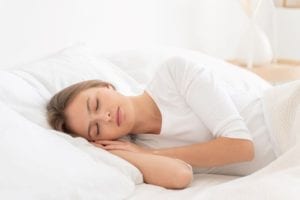Do you rest peacefully in “deep sleep” through the night? Or do you find yourself tossing and turning all night long?
While it isn’t often as talked about, the quality and length of your sleeping cycles can possibly provide insight into whether or not you’re battling with a mood disorder. For example, those who find themselves barely sleeping may potentially have bipolar disorder or depression. Of course, there are many other factors that could be playing a part, too.
Consider your current sleeping habits. If you have difficulty sleeping at night and you’re noticing symptoms of mood issues throughout the day as well, it’s likely time to speak with a licensed healthcare professional.
What Science Tells Us
Previous studies have explored the idea of sleeping patterns and their relation to mood disorders, and they have discovered that the lower the amplitude of circadian rhythm, the greater the risk of having lifetime major depressive disorder, lifetime bipolar disorder, mood instability, neuroticism, lower health satisfaction, and slower reaction times.
Sleep issues are individualized, and no two people are the same. That’s why it is up to you to seek help if you’re experiencing signs of mood issues that are having a direct impact on your life. Some of the signs may include:
- Feelings of hopelessness
- Poor concentration
- Fatigue or low energy
- Low self-esteem
- Trouble concentrating or making decisions
A combination of sleep issues and mood issues may indicate something more than just being “tired” or “low” at times. A medical professional can help you determine if you have a mood disorder, such as depression, or if your sleep issues are occurring for a different reason.
Understanding Your Circadian Rhythm
To better explain how sleep and mood disorders work, it’s best to understand what a circadian rhythm is and how it works. A circadian rhythm is your body’s internal clock – it works 24 hours a day. Most people tend to experience dips in their rhythm (fatigue) around 2-4 a.m. (when they are already asleep) and around 1-3 p.m. (shortly after they have eaten lunch). This can easily be disrupted if a person has experienced an event during the day that causes them to stay up very late at night, or at least not to sleep well.
Circadian rhythm disruptions are a major hallmark of mood disorders, and disrupting your circadian rhythm with shift work or jet lag can make mood disorder symptoms even worse.
Help Is Available
You don’t have to suffer through sleepless nights –or the aftermath – alone. If you believe you may have a mood disorder, speak with a professional from Avalon Malibu to learn more about your treatment options.
Avalon Malibu is a world-renowned mental health and substance abuse recovery center. At Avalon Malibu, not only do you receive a diagnosis, but you also gain the resources and support you need to find wholeness within you and in life. We are ready to help. Call us today at (844) 857-5992 for a consultation.












